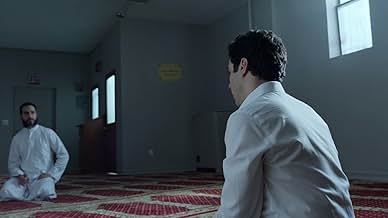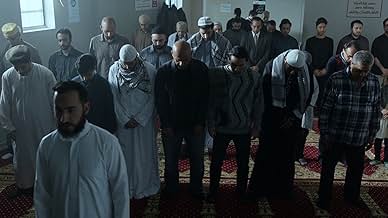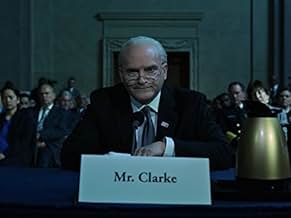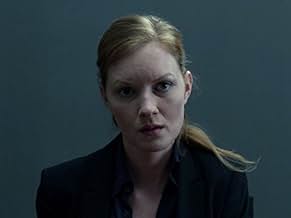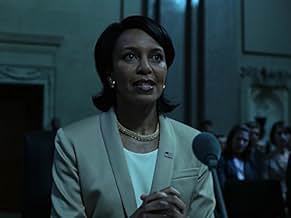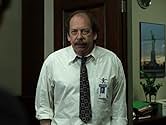Uno sguardo a come la rivalità tra CIA e FBI abbia inavvertitamente posto le basi per la tragedia dell'11 settembre e la guerra in Afghanistan.Uno sguardo a come la rivalità tra CIA e FBI abbia inavvertitamente posto le basi per la tragedia dell'11 settembre e la guerra in Afghanistan.Uno sguardo a come la rivalità tra CIA e FBI abbia inavvertitamente posto le basi per la tragedia dell'11 settembre e la guerra in Afghanistan.
- Candidato a 4 Primetime Emmy
- 15 candidature totali
Sfoglia gli episodi
Recensioni in evidenza
I started watching this show because Jeff Daniels always delivers. He continues to do so here.
The miniseries presents a thought provoking picture of how the CIA and the FBI had conflicting ideas about how best to oppose Al Qaeda in the late 1990s and 2000. It suggests that these agencies' inability to work together created opportunities for Jihadism to fester and grow. This part of the series is powerful and well realized.
Less interesting are its forays into the private lives of its main characters. I'm 4 episodes in and still don't get the point of these subplots. I see how these interludes show the softer and messier sides of these characters lives, but they don't seem to have anything at all to do with the larger story of Al Qaeda's rise. As a result, these parts feel like filler in what would otherwise be a very tight, well focused political drama.
That said, this show does a fine job of assessing where our country's intelligence agencies, media, and citizenry succeeded and where we failed when it came to Al Qaeda. It's a sobering and fascinating story. As I watch, I keep thinking, "How did our world manage to get so very screwed up!"
The miniseries presents a thought provoking picture of how the CIA and the FBI had conflicting ideas about how best to oppose Al Qaeda in the late 1990s and 2000. It suggests that these agencies' inability to work together created opportunities for Jihadism to fester and grow. This part of the series is powerful and well realized.
Less interesting are its forays into the private lives of its main characters. I'm 4 episodes in and still don't get the point of these subplots. I see how these interludes show the softer and messier sides of these characters lives, but they don't seem to have anything at all to do with the larger story of Al Qaeda's rise. As a result, these parts feel like filler in what would otherwise be a very tight, well focused political drama.
That said, this show does a fine job of assessing where our country's intelligence agencies, media, and citizenry succeeded and where we failed when it came to Al Qaeda. It's a sobering and fascinating story. As I watch, I keep thinking, "How did our world manage to get so very screwed up!"
Aside from the excellent way it showed how the CIA and the FBI would not work together, they both had bad ideas of how to handle it. The CIA was mostly academic and the FBI was mostly just knock down doors. Both had the wrong prescription. I hope they are all doing it differently and together, but I fear that they are not. Bush didn't want to be "batting at flies" and I fear that Trump doesn't want to either.
Condaleesa Rice's comment after the Twin Towers that "no one would have thought that someone would do that" is particularly galling, because in fact a person on her staff who was the old Security Advisor would have told her just that if she ever took time to listen and take him seriously. History should really reconsider what it is now saying about her in light of these revelations.
The timing of the episodes seem perfectly timed to what was going on. It showed how we really didn't have much of a clue and the lack of sharing made each less knowledgeable and less able to get the needed incite.
Condaleesa Rice's comment after the Twin Towers that "no one would have thought that someone would do that" is particularly galling, because in fact a person on her staff who was the old Security Advisor would have told her just that if she ever took time to listen and take him seriously. History should really reconsider what it is now saying about her in light of these revelations.
The timing of the episodes seem perfectly timed to what was going on. It showed how we really didn't have much of a clue and the lack of sharing made each less knowledgeable and less able to get the needed incite.
10jshoaf
The last episode, which begins when the first plane hits (not a spoiler), brought me up against my own memories of 9/11. My son was in the city, and on that day I worried about him and listened to him on the phone. Aside from that, I was numb. It seemed utterly incomprehensible that this should have happened. Who? Why? How? Equally incomprehensible was the speed with which these questions were in fact answered, for reasons the Hulu series makes clear: the answers were already at the fingertips of various players who didn't know what to do with them (though the finale implies that various parties were prepared to exploit the bombing instantly). The series begins at the (or a) beginning, including the Kenyan embassy bombing, the USS Cole bombing, and interactions among the players on both sides. The questions have been answered, the lines drawn in such a way as to meet at this point, with the bombings. As I watched the last episode, I was able to feel for the people I love who were breathing that dust that day. I could finally weep for them, as well as for John O'Neill and Ali Soufan, whom I had not known about until now.
A great insight into the self serving American bureaucracy and their buck passing.
I am stunned that the security of American citizens was in control of so many egomaniacs. Absolutely no flow of communication between anyone.
It is remarkable, considering the amount of intelligence that was harnessed, that this occurred and that the death toll wasn't greater.
I am stunned that the security of American citizens was in control of so many egomaniacs. Absolutely no flow of communication between anyone.
It is remarkable, considering the amount of intelligence that was harnessed, that this occurred and that the death toll wasn't greater.
The whole series was fine, as other reviews suggest.
As an Arab, it is irritating to see all the Arabic language spoken in this series was from an egyption Dialect, regardless of their origin/nationality.
Lo sapevi?
- QuizAt the Berlinale film festival showrunner Dan Futterman explains the rivalry between CIA and FBI in the late 90's. "The FBI was just starting to work as an international agency, and that was part of their problem with the CIA, who felt that was their turf, and the FBI's turf was America. They totally underestimated al-Qaeda."
I più visti
Accedi per valutare e creare un elenco di titoli salvati per ottenere consigli personalizzati
- How many seasons does The Looming Tower have?Powered by Alexa
Dettagli
- Data di uscita
- Paese di origine
- Siti ufficiali
- Lingue
- Celebre anche come
- 塔樓蜃影
- Luoghi delle riprese
- Marocco(Doubling for Yemen)
- Aziende produttrici
- Vedi altri crediti dell’azienda su IMDbPro
Contribuisci a questa pagina
Suggerisci una modifica o aggiungi i contenuti mancanti







